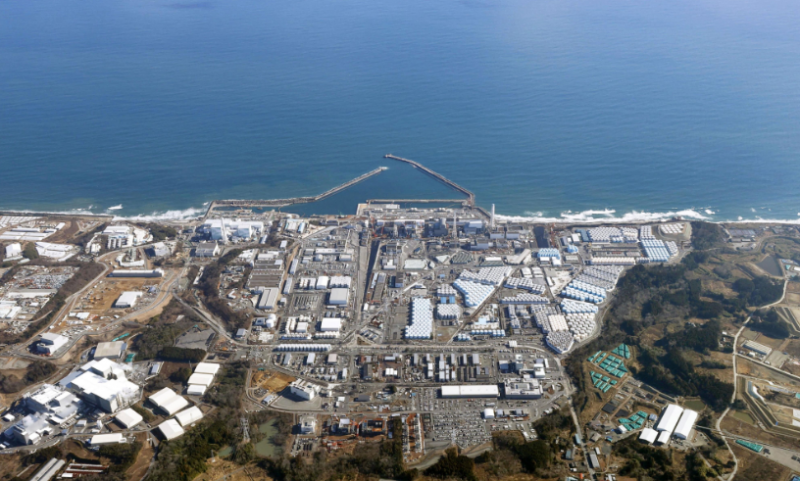
Tokyo: Twelve years after one of the worst nuclear disasters in history, Japan will start releasing cooling water from the crippled Fukushima power plant on Thursday. Despite protests from fishermen and China, which has already prohibited food shipments from a number of Japanese prefectures, the announcement was made.
The UN atomic agency agrees with Japan's assertion that it is safe to release the water that has accumulated at the damaged nuclear plant—enough to fill more than 500 Olympic-size swimming pools—gradually into the sea.
Following discussions with opponents from the fishing industry, Prime Minister Fumio Kishida announced the start date on Tuesday, "if weather and sea conditions do not hinder it."
Also Read: Maryland Man's Dual Guilty Pleas: Daesh-Inspired Attack Plot and Airport Crowd Incident
In March 2011, a devastating earthquake and tsunami that killed about 18,000 people destroyed the Fukushima-Daiichi nuclear plant, causing three of its reactors to melt down.
Since then, the still highly radioactive reactors' remaining parts have been cooled with 1.34 million tonnes of water, which operator TEPCO combined with groundwater and rain that has seeped in.
Except for tritium, whose levels are well below danger levels, TEPCO claims that all radioactive substances have been removed from the water by diluting and filtering it.
According to Tony Hooker, a nuclear expert from the University of Adelaide, tritium has been released (by nuclear power plants) for decades with no evidence of a negative impact on the environment or human health.
A maximum of 500,000 litres (132,000 US gallons) of this water will now be discharged each day into the ocean off the northeast coast of Japan.
Environmental pressure group Greenpeace claims that the filtration procedure is ineffective and that over the next few decades, a "immense" amount of radioactive material will be dispersed into the sea.
At a time when the world's oceans are already under tremendous stress and pressure, Japan "has chosen a false solution — decades of deliberate radioactive pollution of the marine environment," Greenpeace said on Tuesday.
Also Read: Kejriwal extends his Greetings to Praggnanandhaa for entering the final of Chess World Cup
The release would have "negligible radiological impact on people and the environment," the UN nuclear watchdog said in July.
Concerned about the release, many South Koreans have organised protests and even stocked up on sea salt out of concern for contamination.
However, despite taking political risks at home, President Yoon Suk Yeol's administration has worked to warm up long-frozen ties with Japan and hasn't voiced any opposition to the proposal.
Yoon held the first-ever trilateral summit last week at Camp David with Kishida and US President Joe Biden, the three of whom shared concerns about China and North Korea.
China has accused Japan of treating the ocean like a "sewer," imposing strict radiation checks and banning food imports from 10 Japanese prefectures even before the release.
Hong Kong, a significant export destination for seafood from Japan, has also threatened restrictions.
This has alarmed those who work in the fishing sector in Japan, just as the economy was starting to recover more than ten years after the nuclear accident.
"Nothing about the water release is beneficial to us," said third-generation fisherman Haruo Ono, 71, of Shinchimachi, 60 kilometres (40 miles) north of the nuclear plant, whose brother was killed in 2011.
While China's safety concerns may be sincere, James Brady of the Teneo risk consultancy claimed that there was a strong odour of geopolitics and economic rivalry in its harsh response.
Brady told AFP that Beijing could potentially take advantage of the Fukushima wastewater release issue because of its complexity.
Also Read: Pakistan will talk about raising the quota when the Saudi Hajj minister visits
Beijing has the ability to "leverage a degree of economic pressure on the trade axis, exacerbate internal domestic political cleavages on the issue within Japan... and even potentially put pressure on improving diplomatic ties between Seoul and Tokyo."
In a survey conducted by Naoya Sekiya from the University of Tokyo last year, it was discovered that 90% of people in China and South Korea believed the food from Fukushima was "very dangerous" or "somewhat dangerous."
According to Sekiya, "I think that's because Japan hasn't adequately allayed such concerns."
"We must provide a proper and complete explanation.